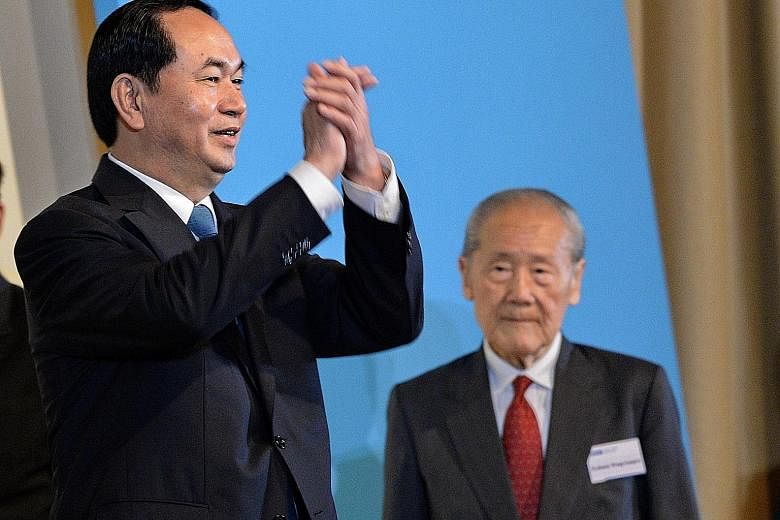There will be no winners, just losers, in the event that the South China Sea dispute boils over into an armed conflict, said Vietnamese President Tran Dai Quang.
He made the point yesterday, when delivering a Singapore Lecture on why it was important for Asean nations to stand united and cooperate to tackle the challenges facing the region and the world.
But in working together, countries need to do so as equals for mutual interest, and with respect for international law, he added.
President Quang's message comes a week before Asean leaders gather in Laos for their annual summit, and are expected to demonstrate a united stand on key challenges facing the region.
Among the leading challenges are territorial and maritime disputes and disputes over resources, he noted, adding that such quarrels are worsened by countries with a "might makes right" mindset.
Mr Quang, who is on a state visit to Singapore, was delivering the 38th Singapore Lecture, organised by the Iseas - Yusof Ishak Institute, before 550 people, including political and business leaders.
Deputy Prime Minister Teo Chee Hean, in introducing the President, said he was the first Vietnamese leader to give the Singapore Lecture.
Mr Quang, pointing to the South China Sea row, said recent events had threatened regional security.
The negative impact, especially on maritime security and safety, freedom of navigation and overflight, threatens to erode trust and affect the region's cooperation process, he said. "Should we allow instability to take place, especially in the case of armed conflicts, there will be neither winner nor loser, but rather all will lose," he added.
Mr Quang did not name any country, but China has been increasingly assertive in its claim to almost all of the sea, through its reclamation projects and military build-up in the disputed areas. It has also stepped up military drills in the sea, and warned the United States that its freedom of navigation patrols there could backfire and end in "disaster".
Mr Quang believes a well-developed and comprehensive regional architecture, with Asean playing a central role, can "satisfy the interests of all parties".
Alluding to recent disagreements that put at risk Asean unity, he said: "Solidarity and consensus are distinct values that member states should respect and preserve."
He called them part of the "core principles of Asean".
Last month, a meeting of Asean foreign ministers in Laos ended without any agreement on how they were going to mention the South China Sea dispute in their communique.
Cambodia, a close China ally, had reportedly tried to block the mention of the maritime dispute in the joint communique, threatening to create a repeat of the debacle in Phnom Penh in 2012 when disagreement over the issue scuttled the statement altogether.
China, Taiwan and the four Asean nations of the Philippines, Vietnam, Malaysia and Brunei have overlapping claims to the strategic waterway.
Asked how Vietnam can contribute to a stronger Asean, which will mark its 50th anniversary next year, Mr Quang said the principle of consensus remains crucial for a strong Asean.
But this can be "supplemented" by other principles, he added, without elaborating.
He also saidVietnam's position on the South China Sea issue remains consistent: It seeks to settle disputes by peaceful means and on the basis of international law, including the 1982 United Nations Convention on the Law of the Sea (Unclos). Singapore, as a founding member of Unclos, "would understand the value of joining hands and joining minds", he added.


